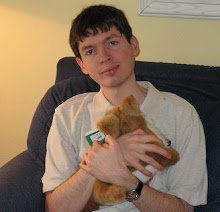I'm writing this post the night after my very first interview! For a first try, I think it was a tremendous success. I interviewed a friend, who I'll call Alice, at her apartment after we had dinner together at Perkins. It was a comfortable way to go into my first interview and both of us felt relaxed as we sat on her sofa, Kino listening from the coffee table, and she began to tell her story.
The content of the story is a topic for later this week. Today I want to talk about the interview as an interview, and in particular what I learned from it. In gross terms, the most surprising feature of our chat was its length: it clocked in at a cool forty-seven minutes! I'd been expecting that interviews would be shorter than that, maybe ten or fifteen minutes. Probably they will be; strangers haven't set the evening aside for me like Alice did, and Alice is talkative by nature. This is important. Pascal said that he wrote a long letter for lack of time to write a short one, and my experience tonight makes me think something similar will be true of interviews. Tonight Alice and I had time to explore several different angles of her love story. I won't always have that luxury. Getting enough interesting detail to make the story unique in ten or fifteen minutes will be harder than doing it in just under an hour.
Which leads into another aspect of interviewing I didn't realize was important until tonight: finding an angle. Boy meets girl is a good story, which is why it's been told so many times, but it's never told the same way twice. Romeo and Juliet is "boy meets girl, only they're from warring clans;" Pride and Prejudice is "boy meets girl, only they're of different social strata;" WALL-E is "boy meets girl, only they're robots;" and so on. These are oversimplifications, but the point is that the story always has a premise beyond the fact of love. Sometimes it's a source of conflict, sometimes of novelty. The same has to be true of my subjects' stories. My job as an interviewer is not just to facilitate storytelling; it's to capture the most unique aspects of the story and how they relate to the common ones. Never at the expense of reality, of course! I'm not going to write caricatures that emphasize an element that was unimportant to the subject's actual experience; I'd sooner not use the interview. But I will find and focus on important elements that distinguish this story from every other love story. Tonight that meant asking questions about the dynamic between Alice's high school boyfriend and his parents. Theirs was an odd relationship that was the source of some tension between Alice and her boyfriend and bore indirectly on other frustrations she had with him. If I could do the interview again I would have focused more on that -- though thanks to the interview's generous length I got an interesting story out of it even without knowing going in that I needed to look for an angle. The hard part will be sussing out that angle under the pressure of time.
Enough for today. More tomorrow!
Monday, March 23, 2009
Subscribe to:
Post Comments (Atom)

Very perceptive, Brian! I think you've drawn some terrific conclusions from this trial interview... and I will be very interested to read what you'll boil out from 47 minutes of interview! Good heavens... Alice must really love to talk about herself...
ReplyDeleteHa ha :P I meant to use your real name here, since you gave me permission, but I wrote the blog the night I got home and forgot to change the name when I posted it early this morning. So now you're Alice for the moment!
ReplyDelete